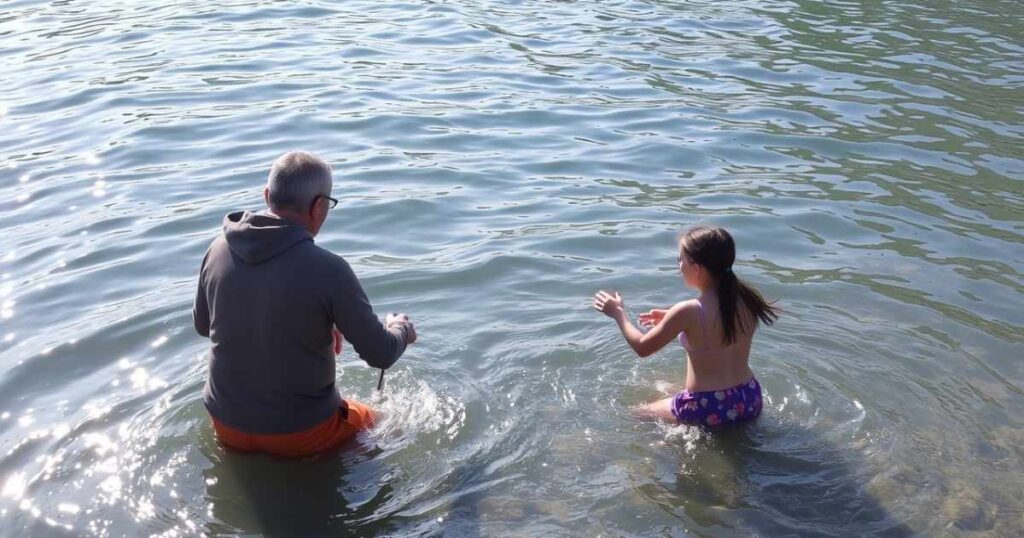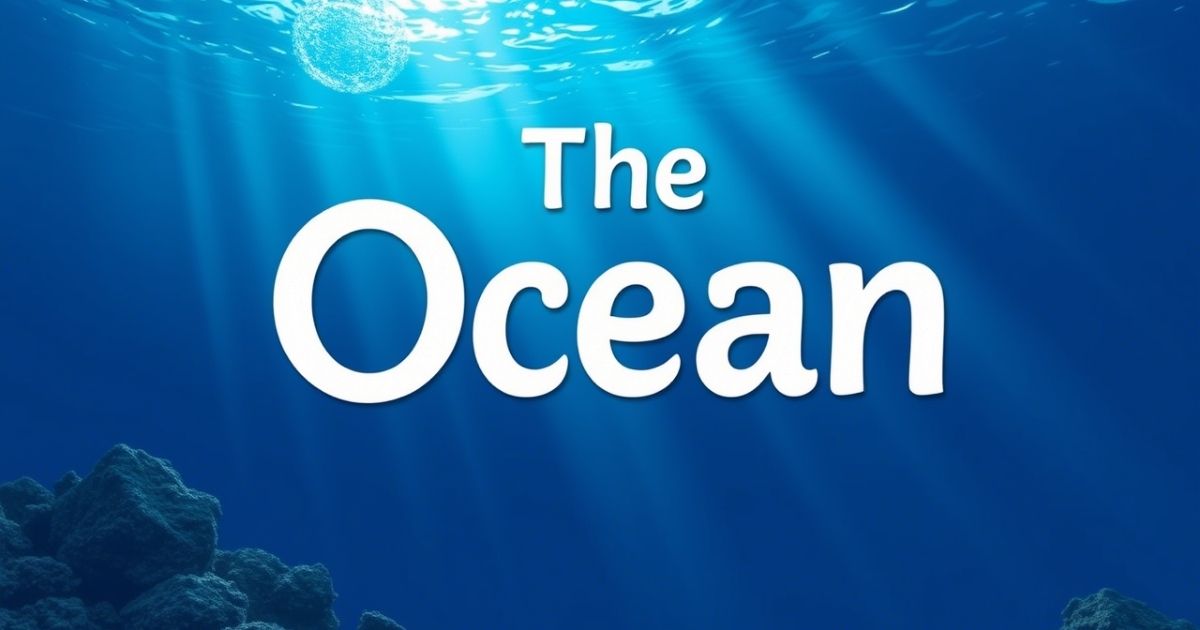The ocean has always been a source of inspiration for idioms for the ocean. These sea idioms help express complex emotions or experiences in a simple, vivid way. When people talk about the ocean, they use these idioms for the ocean to describe life’s ups and downs. Wave idioms are often used to represent changes or challenges, while sea idioms can symbolize calmness or vastness.
In this guide, we will look at many idioms about the sea and ocean idioms that bring these images to life. Whether you’re talking about a calm day or a stormy night, phrases with sea can help you paint a picture. These idioms for the ocean make conversations more colorful and interesting. By learning and using sea idioms, you can improve your language skills and sound more natural. So dive into the world of ocean idioms and discover how they can brighten up your speech. These idioms are fun, easy to use, and help you connect with others.
Idioms for The Ocean
Idioms for the ocean are colorful expressions that use the sea to describe life’s experiences. Sea idioms and ocean idioms help explain emotions, challenges, or calm moments. Wave idioms represent changes, while phrases with sea add vivid imagery to conversations. These idioms about the sea make language more interesting.
1. Catch the current
Meaning: To seize an opportunity or adapt quickly to a situation as it unfolds.
In a Sentence: Sarah decided to catch the current and join the team for the exciting project.
Other Ways to Say: Seize the moment, ride the wave, or go with the flow.
2. Shipshape and ready
Meaning: Something that is neat, well-organized, and in perfect condition for use or action.
In a Sentence: The house was shipshape and ready for the family gathering, everything in its place.
Other Ways to Say: Neat and tidy, well-prepared, or in perfect order.
3. Lost at sea
Meaning: Feeling confused, disoriented, or uncertain about a situation or decision.
In a Sentence: Without a map, Jake was completely lost at sea when trying to find the location.
Other Ways to Say: Out of your depth, in over your head, or unsure of your direction.
4. In over your head

Meaning: To be involved in a situation that is too difficult or overwhelming to handle.
In a Sentence: When Amy agreed to manage the event, she quickly realized she was in over her head.
Other Ways to Say: Overwhelmed, beyond your capacity, or in deep trouble.
5. Weigh anchor
Meaning: To start a journey or embark on a new project or endeavor.
In a Sentence: After months of planning, the team was ready to weigh anchor and begin the adventure.
Other Ways to Say: Set sail, start the journey, or embark on a new path.
6. On the crest of a wave
Meaning: To experience success or great fortune, riding high on the momentum of recent achievements.
In a Sentence: After the successful product launch, Jane felt on the crest of a wave.
Other Ways to Say: Riding high, on top of the world, enjoying a winning streak.
7. High and dry
Meaning: To be left stranded or without support in a difficult or challenging situation.
In a Sentence: After the project failed, Mark was left high and dry with no help.
Other Ways to Say: Stranded, abandoned, or left without assistance during a tough time.
8. Cast adrift
Meaning: To be left without direction or guidance, unsure of what to do next.
In a Sentence: After losing her job, Maria felt cast adrift, uncertain about her future plans.
Other Ways to Say: Lost, aimless, wandering, or in need of direction.
9. Fish out of water
Meaning: To feel uncomfortable or out of place in a particular setting or situation.
In a Sentence: At the formal event, Ben felt like a fish out of water, completely unfamiliar.
Other Ways to Say: Out of your element, awkward, or misplaced in the environment.
10. On an even keel
Meaning: To be in a stable, calm, or balanced state, unaffected by external stress.
In a Sentence: After a hectic week, her life was back on an even keel, feeling peaceful.
Other Ways to Say: Balanced, steady, calm, or under control without disturbances.
11. Weather the storm
Meaning: To endure a difficult or challenging situation and come out stronger on the other side.
In a Sentence: The business managed to weather the storm during the economic downturn and survived.
Other Ways to Say: Overcome adversity, endure hardship, or come through difficult times.
12. Off the deep end
Meaning: To lose control or act irrationally, often out of frustration or intense emotion.
In a Sentence: After hearing the shocking news, Mike went off the deep end and started shouting.
Other Ways to Say: Lose control, flip out, or react impulsively.
13. Cast one’s net wide
Meaning: To expand one’s search or consider many different options or opportunities.
In a Sentence: Sarah decided to cast her net wide by applying for jobs in multiple cities.
Other Ways to Say: Broaden your search, look far and wide, or explore many possibilities.
14. Dead in the water
Meaning: To be completely stuck or unable to progress or make forward movement.
In a Sentence: The plan was dead in the water after the company couldn’t secure the funding.
Other Ways to Say: Stalled, stuck, or unable to move forward due to obstacles.
15. In the same boat
Meaning: To share a common situation or problem, especially one that is difficult or challenging.
In a Sentence: We’re all in the same boat, dealing with the same issues at work.
Other Ways to Say: In this together, sharing the same burden, or united by the challenge.
16. Make waves
Meaning: To create a significant impact or cause a stir, often disrupting the status quo.
In a Sentence: Her new approach at work really made waves and gained attention from upper management.
Other Ways to Say: Stir things up, cause a ripple, or create a buzz.
17. Smooth sailing
Meaning: A situation or task that is easy to handle, free from obstacles or difficulties.
In a Sentence: Once the initial hurdles were overcome, the rest of the project was smooth sailing.
Other Ways to Say: Easy ride, no trouble, or straightforward progress.
18. Sink or swim
Meaning: To face a critical situation where one must succeed or fail based on their actions.
In a Sentence: The new employee was thrown into the deep end, forced to sink or swim.
Other Ways to Say: Rise or fall, succeed or fail, or survive or perish.
19. Go with the flow
Meaning: To accept things as they come, without resistance or trying to control the outcome.
In a Sentence: Instead of stressing out, Lisa decided to go with the flow and enjoy the day.
Other Ways to Say: Adapt to circumstances, follow the current, or let things happen naturally.
20. Test the waters

Meaning: To try something out in a small, low-risk way before fully committing.
In a Sentence: Before launching the new product, they decided to test the waters with a pilot campaign.
Other Ways to Say: Try it out, sample the idea, or dip your toes in.
21. Off the beaten path
Meaning: To go somewhere or do something unusual, away from the usual or common route.
In a Sentence: For their vacation, they chose a destination off the beaten path, far from crowds.
Other Ways to Say: Unconventional, out of the ordinary, or non-traditional.
22. Swimming against the tide
Meaning: To go against the majority opinion or trend, often facing resistance or difficulty.
In a Sentence: John felt like he was swimming against the tide when promoting his unconventional ideas.
Other Ways to Say: Going against the grain, defying the norm, or challenging the status quo.
Related Guide:
23. The calm before the storm
Meaning: A peaceful period just before a situation becomes chaotic or difficult.
In a Sentence: The office was quiet, almost like the calm before the storm, before the big meeting.
Other Ways to Say: Quiet before the chaos, peace before the turmoil, or a brief lull.
24. In deep (water)
Meaning: To be in a difficult or risky situation, often beyond one’s control or understanding.
In a Sentence: After making a risky investment, he found himself in deep water with no options.
Other Ways to Say: In trouble, in over your head, or facing a challenge.
25. Below the surface
Meaning: Something that is hidden, not immediately obvious, or not easily understood.
In a Sentence: There were deeper issues below the surface that no one had noticed until now.
Other Ways to Say: Hidden, beneath the surface, or not immediately apparent.
26. A drop in the ocean
Meaning: A very small or insignificant amount compared to what is needed or expected.
In a Sentence: The donation was just a drop in the ocean compared to the funds required.
Other Ways to Say: A tiny fraction, a small part, or a minuscule amount.
27. Landlubber
Meaning: A person who is not familiar with or comfortable around the sea or sailing.
In a Sentence: As a landlubber, Tom was afraid of the sea and didn’t know how to sail.
Other Ways to Say: Non-sailor, land-based person, or someone unfamiliar with the sea.
28. By hook or by crook
Meaning: To achieve something by any means necessary, whether fair or unfair.
In a Sentence: He promised to finish the project by hook or by crook, no matter the cost.
Other Ways to Say: By any means, no matter what, or at all costs.
29. Offshore accounts
Meaning: Bank accounts located in foreign countries, often for financial privacy or tax purposes.
In a Sentence: The businessman was investigated for hiding his profits in offshore accounts to avoid taxes.
Other Ways to Say: Foreign bank accounts, international accounts, or accounts abroad.
30. A rising tide lifts all boats
Meaning: When the general situation improves, everyone benefits, even those who are struggling.
In a Sentence: The new policies were beneficial for the economy, proving that a rising tide lifts all boats.
Other Ways to Say: Shared success, collective growth, or improving conditions for everyone.
31. All at sea
Meaning: To feel confused, lost, or unsure about something.
In a Sentence: After the sudden change in plans, he was all at sea and didn’t know what to do.
Other Ways to Say: Bewildered, confused, or at a loss.
32. Shipshape and Bristol fashion
Meaning: To be in perfect condition or well-organized.
In a Sentence: The crew made sure everything was shipshape and Bristol fashion before the inspection.
Other Ways to Say: In order, well-maintained, or perfectly organized.
33. In the same boat

Meaning: To be in the same difficult or challenging situation as others.
In a Sentence: We’re all in the same boat, so let’s work together to solve this problem.
Other Ways to Say: In the same situation, facing the same challenge, or in a similar position.
34. All hands on deck
Meaning: To require the help or participation of everyone involved in a task.
In a Sentence: The company was in crisis, and it was all hands on deck to get things under control.
Other Ways to Say: Everyone involved, full team effort, or a collective effort.
35. A rising tide lifts all boats
Meaning: When things improve for one person or group, others also benefit.
In a Sentence: The strong economy helped everyone, proving that a rising tide lifts all boats.
Other Ways to Say: Shared prosperity, collective benefit, or group improvement.
Exercise to Practice
- After a long day at work, Sarah decided to ____________ and take a walk by the beach.
- Mark was feeling overwhelmed, but he chose to ____________ and tackle his tasks one by one.
- The project was difficult, but Rachel kept going, knowing she had to ____________ and finish it.
- During the storm, the boat was ____________ and had no way to move forward.
- When he lost his job, Mike felt like he was ____________ and didn’t know what to do.
- Jane felt out of place at the party; she was a ____________ among all the experienced people.
- After the tough times, Emma finally felt like things were ____________ and going smoothly.
- Despite his fears, John decided to ____________ and try something new.
- They had to ____________ to survive the challenges ahead.
- He was ____________ when the project went off track and needed immediate correction.
- After the argument, Lisa was feeling ____________ and unsure about everything.
- Tim was ____________ with no support to help him with the task.
- We were all ____________ during the crisis, trying to find a solution together.
- Although the road was tough, we decided to ____________ and not give up.
- The boat was ____________ when it couldn’t start after the storm.
Answers:
- go with the flow
- weather the storm
- keep afloat
- dead in the water
- off the deep end
- fish out of water
- smooth sailing
- test the waters
- sink or swim
- in deep water
- all at sea
- cast adrift
- in the same boat
- go with the flow
- stuck
FAQ’s
Do Idioms for The Ocean have different meanings?
Yes, like other idioms, Idioms for The Ocean can have various meanings depending on the context. Always consider the situation when using them.
What are Idioms for The Ocean?
Idioms for The Ocean are expressions that use ocean-related imagery to describe situations or feelings. These idioms add creativity to everyday conversations.
How do Idioms for The Ocean enhance communication?
Idioms for The Ocean help make language more vivid and engaging. They provide unique ways to express complex ideas simply and creatively.
Can Idioms for The Ocean be used in formal writing?
While mostly used in casual conversations, some Idioms for The Ocean can be included in creative or informal writing to add flair and personality.
What are some examples of Idioms for The Ocean?
Some examples of Idioms for The Ocean include “smooth sailing,” “in deep water,” and “catch a wave.” These idioms bring a fresh perspective to language.
Conclusion
Idioms for The Ocean add creativity and depth to everyday language. These expressions, like “catch a wave” or “in deep water,” help us describe situations with vivid imagery. “Idioms for The Ocean” are widely used, making them a fun and relatable way to communicate. Whether we’re feeling relaxed like “smooth sailing” or overwhelmed like “in the same boat,” these phrases bring emotions and ideas to life.
Using “Idioms for The Ocean” makes conversations more interesting and memorable. They offer unique ways to explain complex feelings and experiences. With expressions like “a drop in the ocean” or “weather the storm,” we can express a variety of emotions, from excitement to frustration. So, the next time you talk, remember to include an ocean idiom. It will help you connect with others and make your speech more engaging.

Ronan Fox is an experienced administrator with five years of expertise in managing operations, streamlining workflows, and ensuring organizational efficiency. He excels in team coordination, process optimization, and problem-solving. His strong leadership and analytical skills drive productivity and success.








